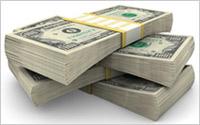 The daunting task for search marketers to understand the relationship between paid and organic search campaigns could become easier. Some critics argue that paid search cannibalizes
revenue from organic listings, but a year-long study between Resolution Media, Kenshoo and Hewlett-Packard disagrees. Paid search not only fills gaps as organic listings drop on the first page, but is
also the only viable option when organic results fall off the first page.
The daunting task for search marketers to understand the relationship between paid and organic search campaigns could become easier. Some critics argue that paid search cannibalizes
revenue from organic listings, but a year-long study between Resolution Media, Kenshoo and Hewlett-Packard disagrees. Paid search not only fills gaps as organic listings drop on the first page, but is
also the only viable option when organic results fall off the first page.
Paid-search ads alongside organic listings in position two through five receive two out of every three clicks from the
search engine results page (SERP). It's more dramatic when organic results are well below the fold in positions six through 10, with paid search responsible for nine out of 10 clicks to the Web
site.
The study analyzes the relationship between paid and organic search marketing for a major U.S. retail division of Hewlett Packard (HP). The dataset covers millions of visits for each of
the paid and organic channels and addresses more than $10 million in direct online sales conversion revenue for each.
advertisement
advertisement
The HP paid-search campaigns analyzed for the study, compared with
organic, drove 3.2% higher Net Revenue per Visit (NRPV), defined by subtracting paid cost per visit from paid revenue to make it directly comparable to organic revenue.
The research attempts
to answer whether paid or organic drive more clicks and revenue, and if there is more incremental value in one vs. the other for top keyword positions. It also attempts to determine the correlation
between rank positions for first-page organic listings, how paid-search strategies can best complement the exposure, the value of paid search when organic results do not appear on the first page, and
how do results vary between brand and non-brand terms?
Even when organic results fall in the first position, consumers still click on the paid-search ad. In the HP study, when a paid listing
appears on a SERP with the top organic listing for the same keyword, the search garners 60.4% of the clicks, while paid search gets 39.6%. Paid search's NRPV is slightly higher than Organic, so Net
Paid Revenue Share rises to 41.6% of total revenue.
Paid search is the only visible option when organic rankings fall off the first page. Click share is about even when organic results appear
on the first page, but paid search garners 93.1% of search engine clicks from the same keyword when organic results do not appear on the first page.
The eBay study on the effectiveness of
paid-search advertising on organic claimed that brand keyword ads provide no short-term benefits and negative return on investment. The eBay study found for its own brand terms that paid search was
ineffective and a negative cost compared with relying on organic queries alone.
When it comes to non-brand terms, paid-search campaigns outpace the performance of organic search with 77.2%
click share and 70.3% Net Revenue Share. More than two-thirds of all clicks and Net Revenue are generated by paid search for non-brand keywords.
The study also makes a list of recommendations
that marketers can follow. Resolution Media and Kenshoo analyzed the period from Feb. 28, 2012 through March 1, 2013, with U.S. campaign performance of the HP's Imaging and Printing Group (IPG).
"Stacks of Money" photo from Shutterstock.